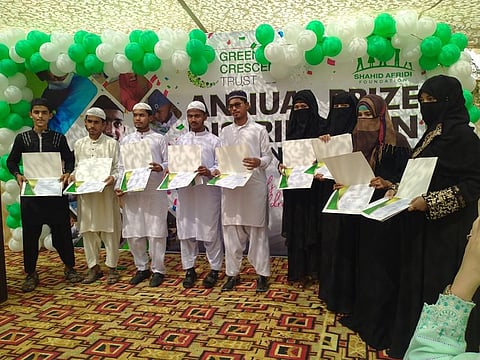Green Crescent Trust, Shahid Afridi Foundation help Rohingya Muslim community students pass Class 10 exams
Ceremony held at the school premises to recognize its batch of graduating students

Karachi: Just over five years back the impoverished community of fishermen near the neglected coastal strip of Karachi had no formal or informal schooling facility. Today, a charitable school is not just present in the area, but is flourishing with news that the first batch of students passed the Class-10 high school examinations.
Arakanabad area of Korangi is home to around 10,000 Rohingya Muslims who hailed from Myanmar a few decades back and this is first time the children of the community have passed Class 10 exams.
The charitable school jointly run by the non-profits Green Crescent Trust (GCT) and Shahid Afridi Foundation (SAF) employed both formal and informal modes of education in past five years to educate children.
A ceremony was held at the school premises to recognize its batch of graduating students.
Principal of the school, Umer Usman said a survey was held in May 2015 which ascertained no children of the area had been going to school mainly due to extreme poverty and lack of free schooling. He said the school had to enrol children of older ages in junior classes as they had not attended any school. He said that minimum 60 per cent marks in the exams were made compulsory for promotion to next class while on attaining 90 per cent marks the intelligent students were given double promotion to the senior classes.
The principal said that students of the area had been granted the opportunity to do their matriculation in Science subjects. He said that ten students passing from the school, including four females, had all attained admission in colleges for further education. He said the school at present enrolled 138 female and 121 male students.
Quality education
Habibur Rehman, an elder of the area who actively took part in the school construction, said the school had emerged as the first educational facility in the area providing quality education.
He appealed to the philanthropists and influential people to provide patronage and guidance to expand the school for increasing the enrolment.
Muhammad Ismail, who secured first position in the bath of Class 10 students of the school, said that before joining the school he had used to go along with his father to sell fruit using a pushcart.
Another graduating female student of the school Shahnaz Binte Mohmmad Sohaib said the school had emerged as a big blessing for the area people as it provided a secured environment for schooling with free education along with provision of note books and textbooks without any charge.
Abdul Ghaffar Umer, Secretary General of GCT, said that President Dr Arif Alvi had been one of the founding trustees of the GCT when it came into existence around 25 years back to enrol out-of-school children in Sindh.
Zahid Saeed, CEO of GCT, said the financial assistance from the DFID (Department for International Development of the UK) provided through the Education Fund for Sindh had made it possible to establish the Arkanabad School.
He said the school project ran into financial difficulties after a few years as the arrangement of foreign funding had come to an end as the SAF joining hands with the GCT ensured sustainability and expansion of the school.
Abdul Qadir, representing the SAF, said the children graduating from the school would continue to receive financial assistance from the SAF for further education up to the university-level.
Graduating students were given prizes and commendation certificates for passing the Class 10 exams. Rest of the names of the graduating students are: Abdul Karim, Mohammad Yaseen, Mohammad Tayyab, Iqbal Hussain Syed, Mohammad Noor, Firdous Bibi, Ayesha, Naeema.
Sign up for the Daily Briefing
Get the latest news and updates straight to your inbox







